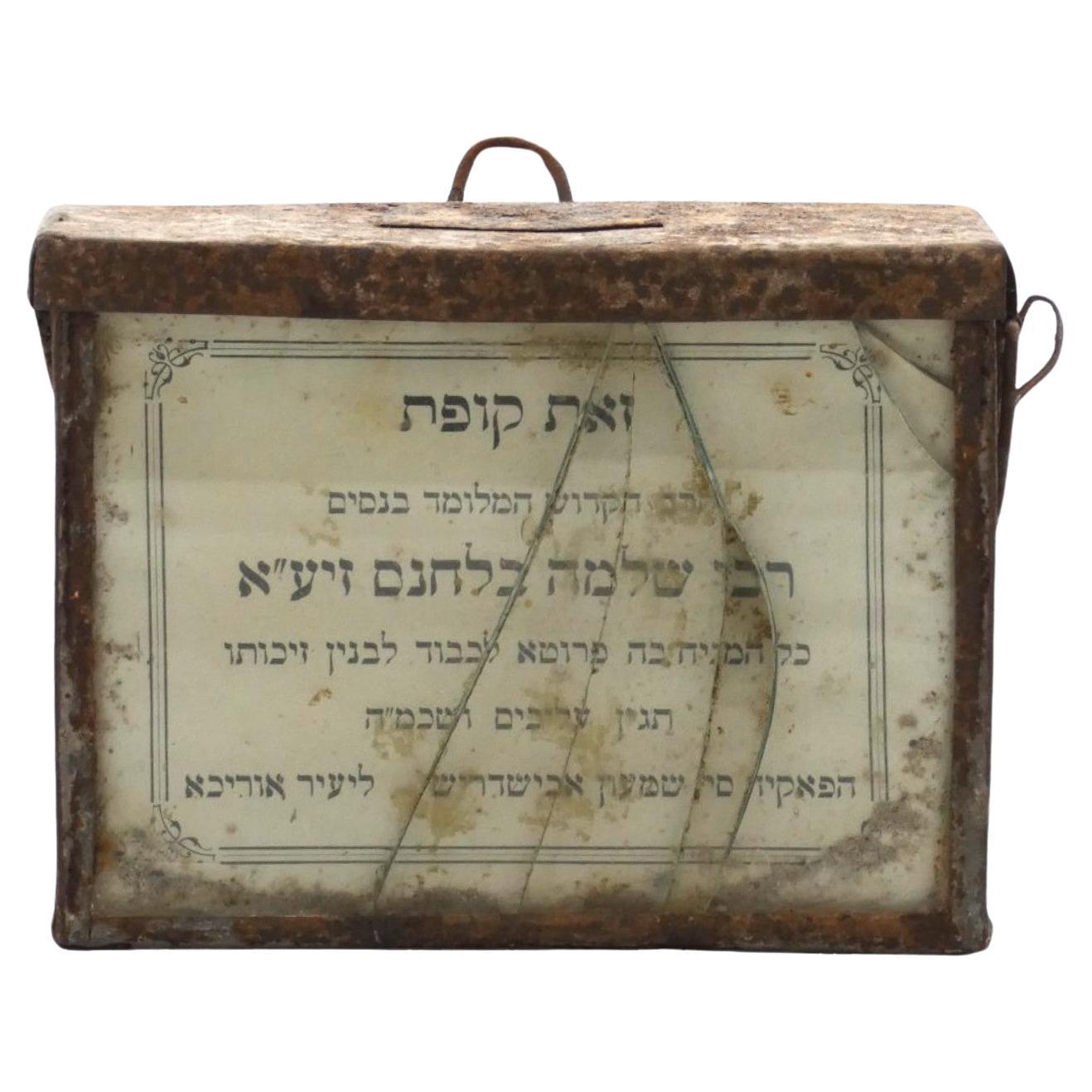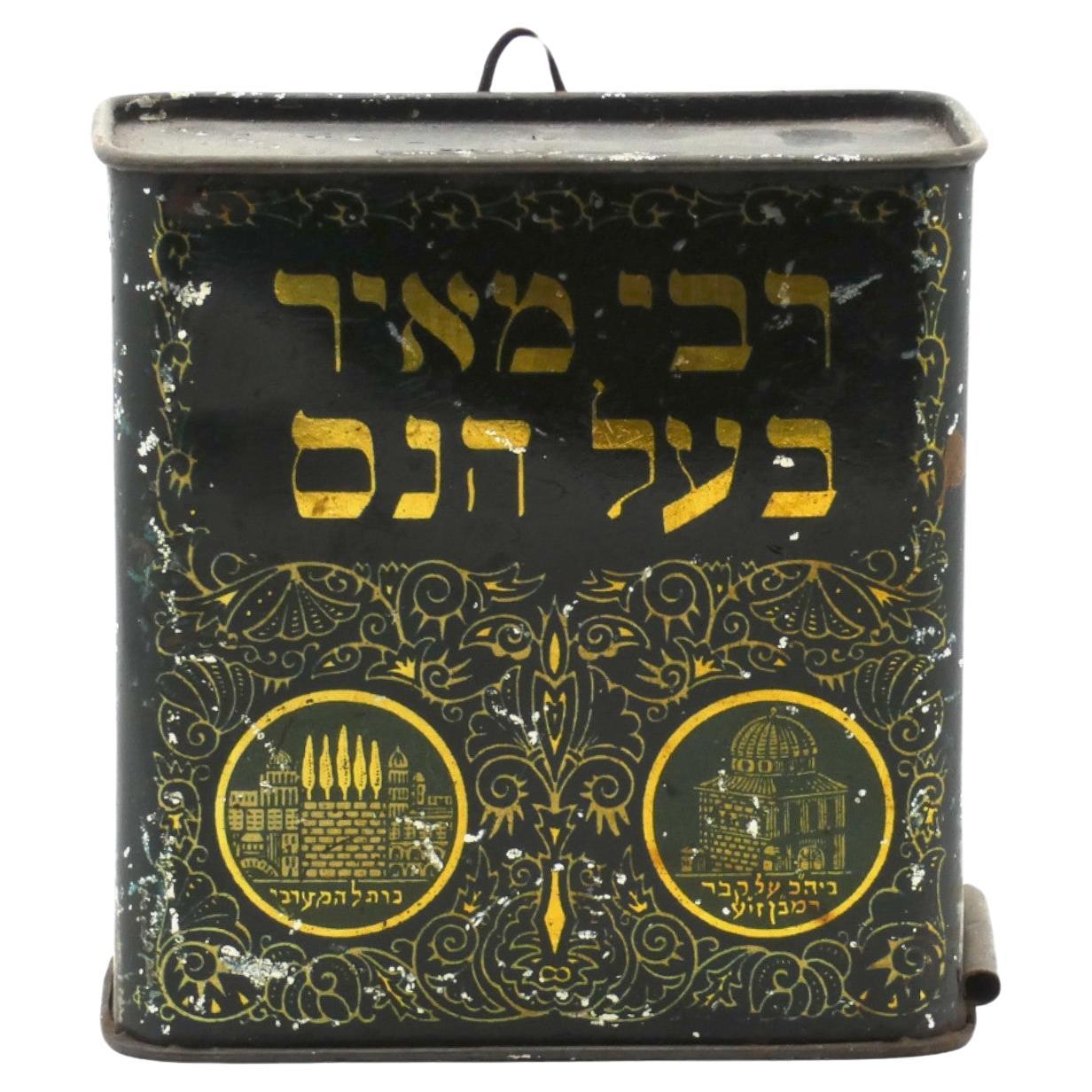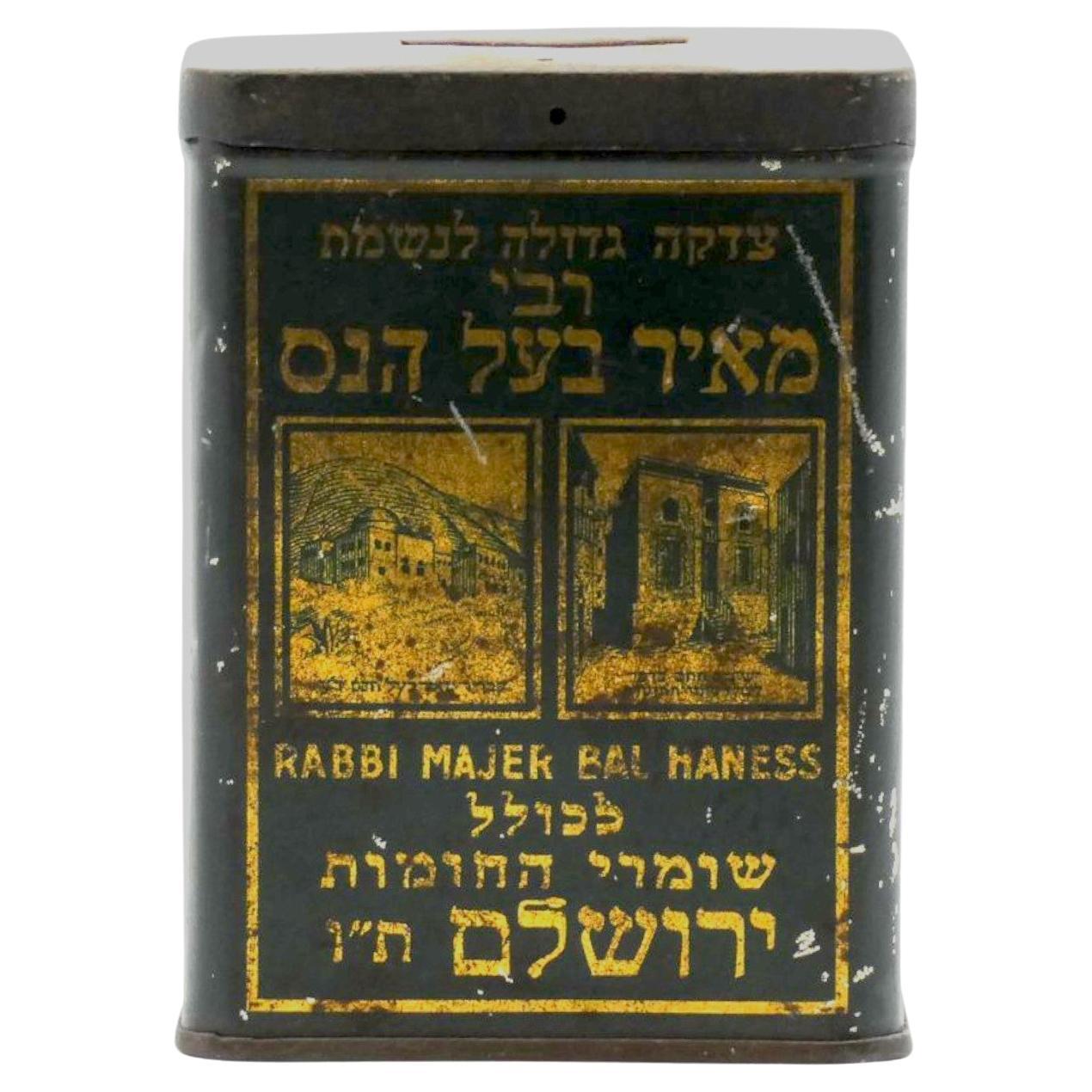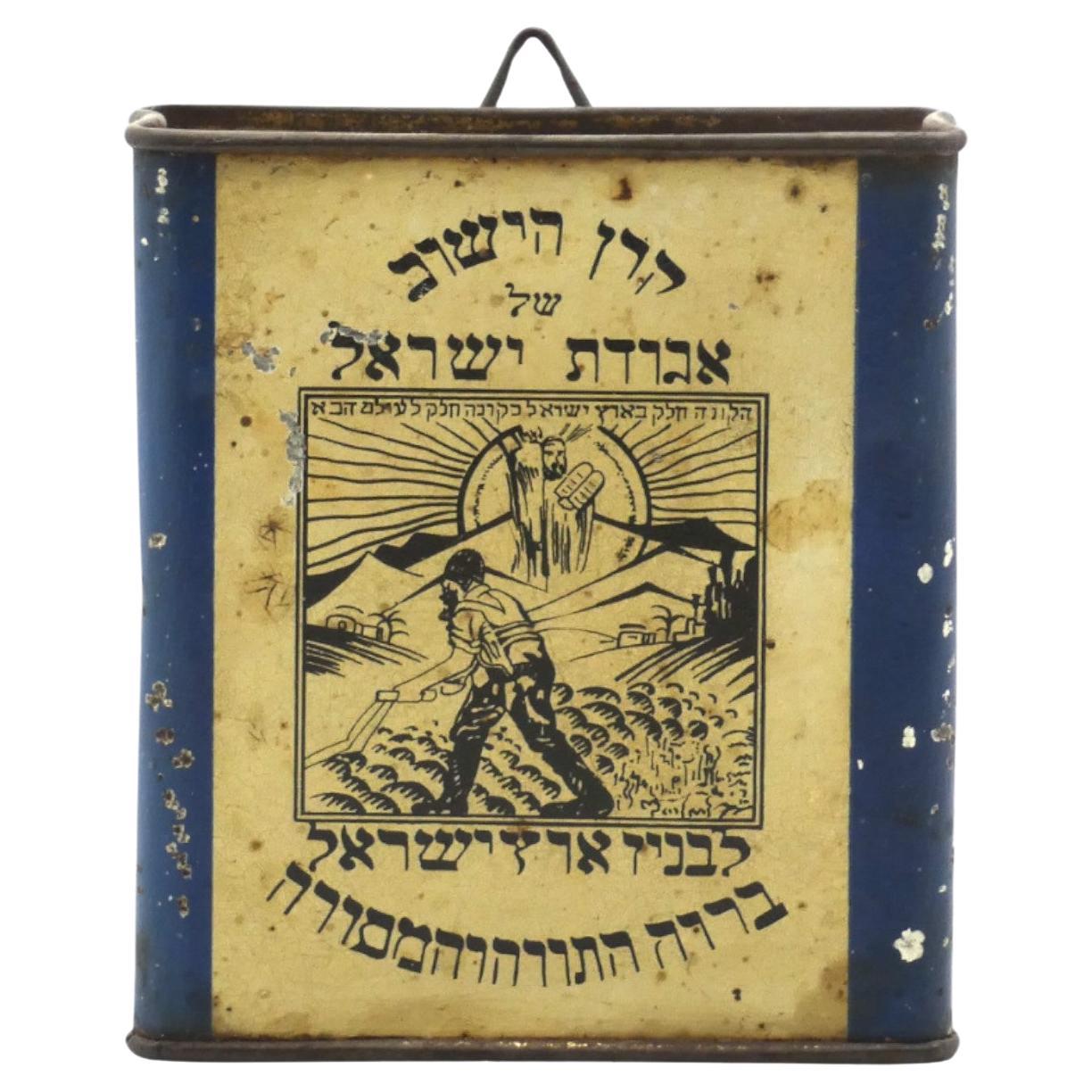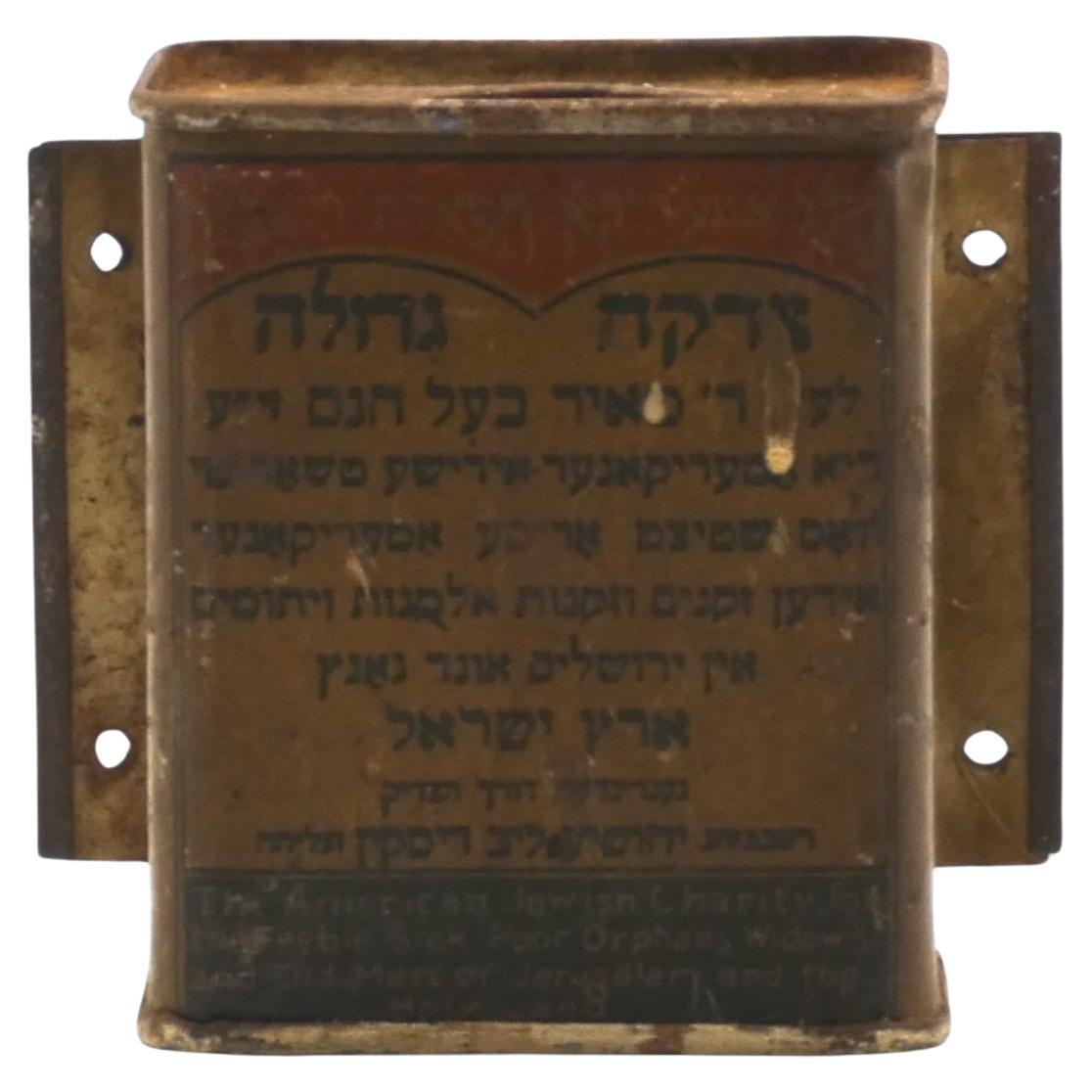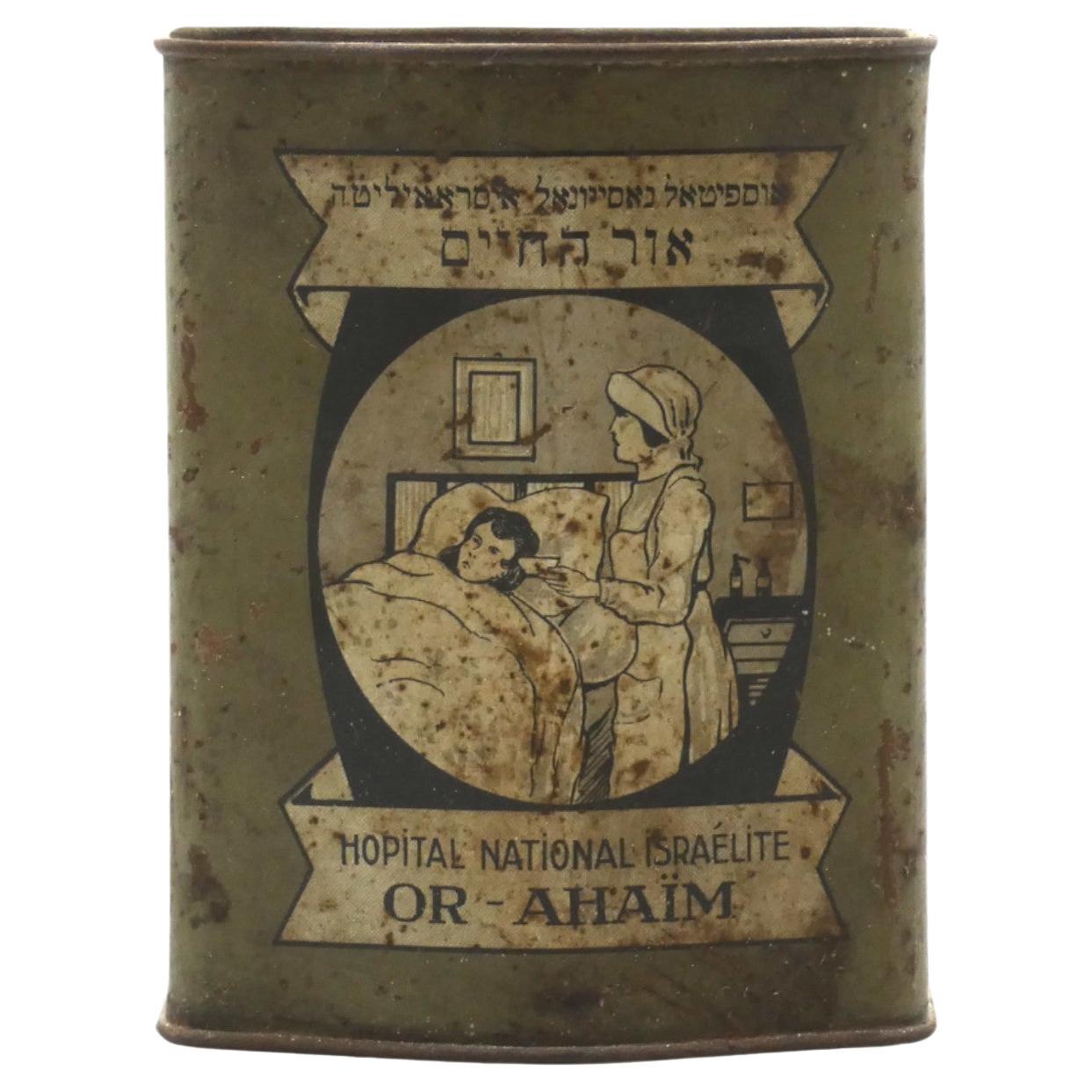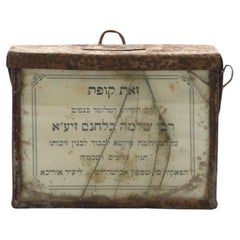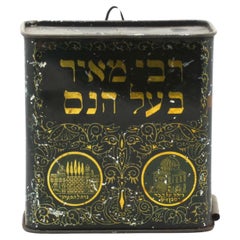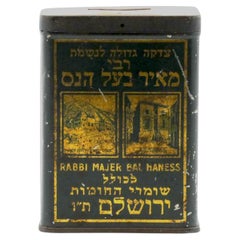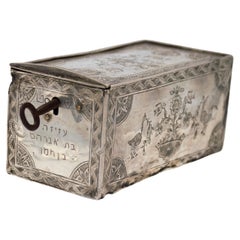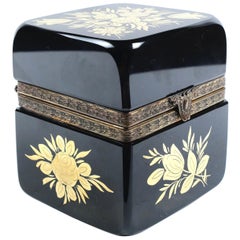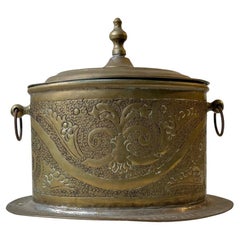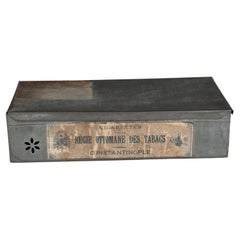Items Similar to A Glass & Tin Moroccan Charity Container, Fez 1920
Want more images or videos?
Request additional images or videos from the seller
1 of 6
A Glass & Tin Moroccan Charity Container, Fez 1920
$2,000
$2,50020% Off
£1,502.46
£1,878.0720% Off
€1,732.58
€2,165.7220% Off
CA$2,775.26
CA$3,469.0820% Off
A$3,083.93
A$3,854.9120% Off
CHF 1,616.01
CHF 2,020.0120% Off
MX$37,818.87
MX$47,273.5920% Off
NOK 20,611.27
NOK 25,764.0920% Off
SEK 19,390.33
SEK 24,237.9120% Off
DKK 12,931.21
DKK 16,164.0120% Off
Shipping
Retrieving quote...The 1stDibs Promise:
Authenticity Guarantee,
Money-Back Guarantee,
24-Hour Cancellation
About the Item
Antique glass and tin Moroccan Bikur Cholim charity container from Fez, circa 1920, is a fascinating artifact blending both cultural and historical significance.
In Jewish tradition, "Bikur Cholim" refers to visiting and supporting the sick, emphasizing the importance of charity and kindness. This charity container played a crucial role in fostering communal support and compassion within the Jewish community of Fez.
Seemingly this charity container was not mass-produced and distributed worldwide from looking at the materials used to create it and by the inscription placed within. Made of tin in a rectangular shape a glass window protects the slip of paper inscribed within with a cover that fits onto the main body and a latch at its side for securing purposes. It was made locally to collect donations specifically for aiding the sick, supporting hospitals, and assisting needy families during times of illness.
Printed on a slip of paper inserted into the front glass of the container in Hebrew: " The Organization for Bikur Cholim" and underneath it is inscribed the name of the city the organization is from. At the top, in French: "Societe De Bienfaisance Israelite" which translates to "Israeli Benevolent Society".
In 1920 Fez was a prominent cultural and religious center in Morocco, known for its diverse communities including Jewish inhabitants. Jews in Fez were integral to the city's economic and cultural life, contributing to the rich tapestry of Moroccan society. Culturally it represents a valuable artifact of Moroccan Jewish heritage, showcasing the intersection of religious practice and community life in early 20th-century Fez.
This charity container from Fez circa 1920 serves as a poignant reminder of the charitable traditions and cultural diversity that characterized Moroccan society during that era, particularly within its Jewish community.
Provenance: The Willie Lindwer Collection.
- Dimensions:Height: 10.7 in (27.18 cm)Width: 14.7 in (37.34 cm)Depth: 5 in (12.7 cm)
- Materials and Techniques:
- Period:
- Date of Manufacture:1920
- Condition:Wear consistent with age and use. Glass is cracked at the front.
- Seller Location:New York, NY
- Reference Number:1stDibs: LU5281240029402
About the Seller
5.0
Recognized Seller
These prestigious sellers are industry leaders and represent the highest echelon for item quality and design.
Established in 2006
1stDibs seller since 2020
130 sales on 1stDibs
Typical response time: Several days
- ShippingRetrieving quote...Shipping from: Pomona, NY
- Return Policy
Authenticity Guarantee
In the unlikely event there’s an issue with an item’s authenticity, contact us within 1 year for a full refund. DetailsMoney-Back Guarantee
If your item is not as described, is damaged in transit, or does not arrive, contact us within 7 days for a full refund. Details24-Hour Cancellation
You have a 24-hour grace period in which to reconsider your purchase, with no questions asked.Vetted Professional Sellers
Our world-class sellers must adhere to strict standards for service and quality, maintaining the integrity of our listings.Price-Match Guarantee
If you find that a seller listed the same item for a lower price elsewhere, we’ll match it.Trusted Global Delivery
Our best-in-class carrier network provides specialized shipping options worldwide, including custom delivery.More From This Seller
View AllA Moroccan Charity Container, Circa 1920
Located in New York, NY
This Moroccan charity container from around 1920 is a unique artifact that represents the containers that were often used for collecting donations or contributions for various charit...
Category
Vintage 1920s Moroccan Religious Items
Materials
Tin
$2,000 Sale Price
20% Off
A Rabbi Meir Ba'al Haness Charity Container, Israel Circa 1920
Located in New York, NY
A Rabbi Meir Ba'al Haness charity container from Israel circa 1920 is an artifact associated with Jewish religious devotion and charitable traditions.
Rabbi Meir Ba'al Haness, also ...
Category
Vintage 1920s Israeli Religious Items
Materials
Tin
$1,440 Sale Price
20% Off
A Tin Charity Container, Belgium Early 20th Century
Located in New York, NY
A tin charity container for Kollel Shomrei HaChomot in Belgium from the early 20th century was used to collect donations for this religious institution comprising several schools, an...
Category
Early 20th Century Belgian Religious Items
Materials
Tin
$1,200 Sale Price
20% Off
A Keren Hayeshuv Charity Container, Israel Circa 1940
Located in New York, NY
A Keren Hayeshuv charity container from Israel circa 1940 is an artifact tied to the early years of the State of Israel and its efforts to support Jewish settlement and development.
Keren Hayeshuv, which translates to "The Settlement Fund," was an organization established in Israel during the pre-statehood period and continued its activities after the establishment...
Category
Vintage 1940s Israeli Religious Items
Materials
Tin
A Kollel America Charity Container, New York Circa 1930
Located in New York, NY
A Kollel America Tiferet Jerusalem Charity Container from New York circa 1930 is tied to the charitable activities of Jewish immigrant communities in America raising donations for ca...
Category
Early 20th Century American Religious Items
Materials
Tin
$720 Sale Price
20% Off
A Turkish Or-A'Haïm National Israelite Hospital Charity Container, Circa 1930
Located in New York, NY
A charity container for the Turkish Or-A'Haïm National Israelite Hospital from circa 1930 is a historically significant artifact reflecting efforts to support healthcare and charitab...
Category
Vintage 1930s Turkish Religious Items
Materials
Tin
$1,920 Sale Price
20% Off
You May Also Like
extremely rare Algerian Judaica silver, jewish Dowry box early 19th century
Located in Tel Aviv - Jaffa, IL
Amazing and scarce JUDAICA object, we have here one of the most touching jewish objects we had for a long time, this small silver dowry box was made in Algeria in the early 19th century, it is all covered with symbols of jewish faith and of couples, the sliding lid has 2 flanking birds with hamsa (protective hand) on each side and a flower vase in the middle.
one side shows two flanking lions with a tree in the middle and the other side shows again two big and two small birds with a flower bowl in the middle, front side has a key hole and next to it there is the Hebrew inscription ס״ט״" which says Siman tov or in English "a good sign" it is taken from the wedding blessing, underneath the lock there is another inscription with the name ״עזיזה בת אברהם בן חמו״ which is the name of the bride, her father and her grandfathers name.
the box is full marked a lot of times with the silversmith mark, every side of the box is marked.
this box was probably ordered by the grooms family to hold the jewelry they are giving to the bride as dowry, this type of objects are rare and there are just a few of them on museum collections.
DOWRY (Heb. נְדֻנְיָה), the property a wife brings to her husband at marriage; the Yiddish equivalent, nadn, is from the same root. The custom of nedunyah became clearly defined and institutionalized only in the talmudic period. In biblical times, mohar (מֹהַר), whereby the groom bought his wife from her father (Gen. 24:53; Ex. 22:15–16; Hos. 3:2), was the accepted practice. It was then customary that the groom give the bride gifts, and that she bring certain property to her husband's home upon marriage: slaves, cattle, real estate, etc. (cf. Gen. 24:59–61; 29; Judg. 1:14ff.; I Kings 9:16). Evidence of the custom of nedunyah is to be found in Tobit (7:14; 8:21) and in the Assuan papyri (Cowley, Aramaic, nos. 15, 18). Gradually, mohar was superseded by the ketubbah custom according to which the husband merely assumed the responsibility of compensation to his wife in case he divorced her: he had to pay her 200 zuzim if she had been a virgin at the time of marriage, and 100 zuzim if a widow or divorcée (see *Ketubbah).
By talmudic times, the institution of nedunyah was prevalent; the father gave a dowry to the bride since the daughter was excluded from paternal inheritance. Fifty zuzim (equivalent to the worth of 180 grams of silver) was the minimum amount a father was obliged to give to his daughter (Ket. 6:5). Parents usually gave much more, according to their social standing. Community funds provided the dowry for an orphan or a very poor girl (ibid.; cf. Sh. Ar., YD 251:8). In case of her father's death, the brothers of a minor girl were obliged to give her the minimum dowry, and the court estimated how much her father would have given her above the minimum dowry. The sum was then taken out of the father's estate and given to the daughter upon majority (Ket. 6:6; 68a–69b). In the absence of such an estimate, each daughter was entitled to receive one-tenth of the value of her father's estate in money, or in valuables (Yad, Ishut, 20:4–7; Sh. Ar., EH 113:4). If the father was unable or unwilling to pay the promised dowry at the betrothal ceremony, the groom could refuse to marry his bride (Ket. 13:5; Ket. 108b–109a). Insistence on exact payment of the promised dowry, however, was frowned upon by later rabbinic authorities (Rema to Sh. Ar., EH 2:1). In certain communities it was customary for the groom's father to make a dowry contribution equal to that of the bride's father (Ket. 102b). The dowry, whether given in real estate, slaves, money, or chattel was recorded in the marriage contract (the ketubbah) and in some instances one-third or one-fifth of the actual value of the dowry was added to the sum mentioned in the ketubbah. Based upon a decree enacted by *Simeon b. Shetah (first century C.E.), the Talmud ruled that the husband and his entire property were liable for compensation as stipulated in the ketubbah, either in case he died (when she collected the sum specified in the ketubbah from the heirs) or in case he divorced his wife (Ket. 82b). For the status of the dowry and the husband's rights and obligations, see below. The rabbinic enactments (Takkanot Shum) by R. Jacob *Tam and by the rabbinic synod of the communities of Speyer, Worms, and Mainz (Germany) stipulated that if a woman died...
Category
Antique Mid-19th Century Algerian Tribal Art
Materials
Silver
Early 20th Century French Glass Table Box
Located in Los Angeles, CA
With hand painted details. Brass-mounted. Glass appears to be black. Very heavy. Mint condition.
Category
20th Century French Decorative Boxes
Materials
Brass
Antique Moroccan Tea Caddy in Brass, 1900s
Located in Esbjerg, DK
Late 19th or early 20th century Teacaddy in Hand engraved and embossed brass. Great rich patina that along with its details give it a certain charm. It has a hinged lid that works ju...
Category
Antique Early 1900s Moroccan Late Victorian Tea Caddies
Materials
Brass
$355 Sale Price
25% Off
Large Antique Tobacco Tin Box, 1930s 1940s
Located in Greven, DE
Antique Tobacceo Box from France.
Category
Vintage 1930s French Decorative Boxes
Materials
Tin
Antique Handcrafted Vintage Berber Kabyle Box Africa Algeria 1920
Located in North Hollywood, CA
Antique Handcrafted Vintage Berber Kabyle Box.
Handcrafted vintage North Africa.
Algeria Berber Kabyle box crafted in nickel silver in traditional style of red and green enamels and ...
Category
Early 20th Century Algerian Islamic Decorative Boxes
Materials
Silver, Enamel
Antique Charles X French Cut Glass Casket with a Bronze Mount
By Baccarat
Located in Philadelphia, PA
A fine antique French cut glass casket.
With a pressed and cut glass body and cover with a gilt bronze mount.
Together with an associated key fo...
Category
Antique Early 19th Century French Charles X Glass
Materials
Cut Glass
More Ways To Browse
Antique Container
Antique Containers
Antique Furniture Containers
Antique Religious Prints
Container French
Antique Glass Container
Antique Glass Containers
Moroccan Window
Moroccan Fez
Antique Religious Tapestry
Antique Moroccan Tapestry
Jewish Tapestry
Moroccan Jewish
Jewish Morocco Antique
Oak Church Doors
Carved Tabernacle
Church Crucifix
English Bible
